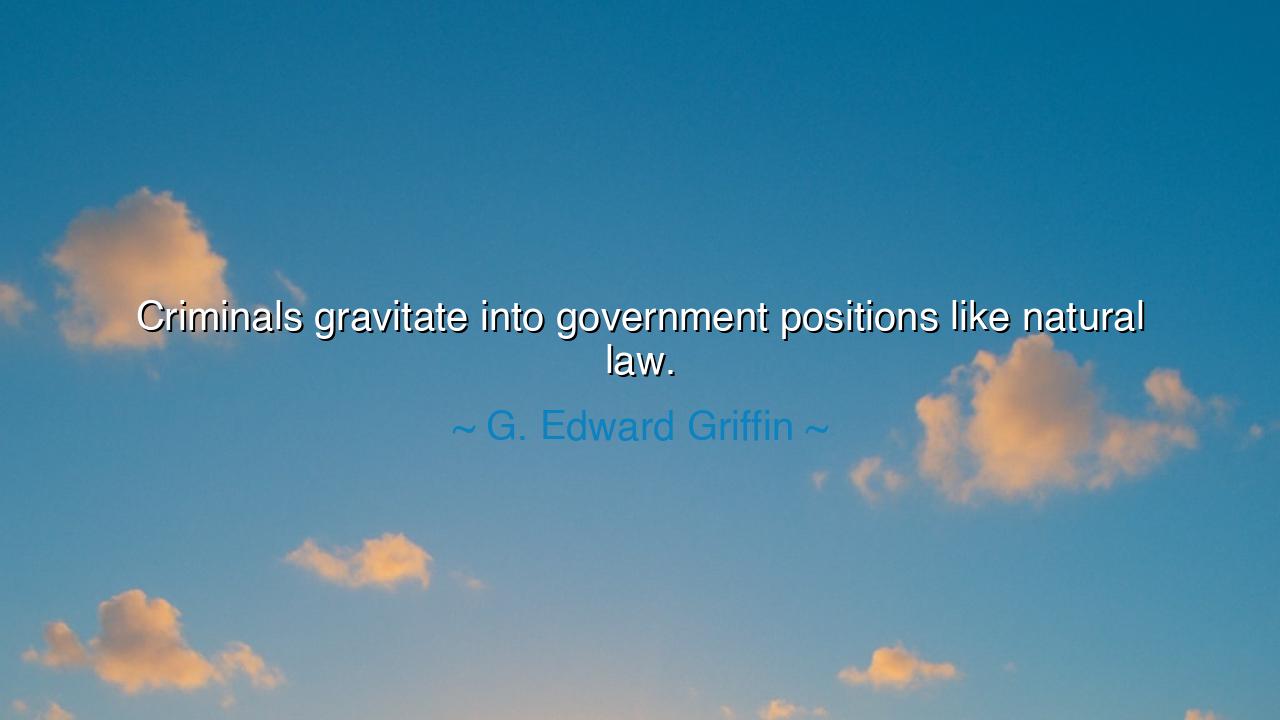
Criminals gravitate into government positions like natural law.






The words of G. Edward Griffin fall upon the ear like the sound of iron striking stone: “Criminals gravitate into government positions like natural law.” In this single sentence lies a truth both ancient and terrible—a truth that civilizations have ignored at their peril. Griffin, a writer and historian of fierce independence, speaks not merely of corruption, but of the magnetism of power itself. For just as the strong are drawn to battle and the wise to knowledge, so too are the ambitious and the unscrupulous drawn to the halls of authority. It is not accident, he warns, but natural law—a force as constant as gravity—that those who desire dominion over others will seek the machinery of the state to achieve it.
The origin of this quote can be traced to Griffin’s long career of exposing the hidden mechanisms of political and financial control. In works such as The Creature from Jekyll Island, he dissected the rise of central banking, bureaucracy, and manipulation of power, arguing that corruption is not an exception within governments, but their inevitable companion. His statement is not one of despair, but of realism: that where power concentrates, so too will those who covet it. It is a warning to every generation that the temptation of authority attracts those least fit to wield it, unless the people remain vigilant.
In the style of the ancients, let us interpret his wisdom through the lens of eternal truth. Power, by its very nature, is intoxicating. To the virtuous, it is a burden; to the corrupt, a feast. The state—any state—offers rewards that no criminal enterprise can match: legitimacy, wealth, and obedience disguised as loyalty. Thus, the cunning no longer need to steal in the shadows when they can rule in the light. Griffin’s “natural law” is the law of human nature itself: those who crave dominance will always seek the throne, the crown, or the office from which they may command others under the pretense of justice.
History confirms this law with grim precision. Consider the fate of Rome, that eternal mirror of power and decline. In her early days, Rome was a republic—a realm of civic duty and virtue, where the Senate served the people and honor was the highest law. But as Rome grew rich and powerful, ambition began to rot the core. Julius Caesar, though brilliant and bold, broke the sacred bonds of republican rule. The corrupt saw his ascent and followed his example, until senators became conspirators and emperors became tyrants. The very system built to protect freedom became the instrument of oppression. Thus, Rome fell not by foreign invasion alone, but by the decay of her own rulers—criminals elevated by the gravity of power.
But this law has not died with Rome. It lives in every age, from the palaces of monarchs to the parliaments of modern democracies. When leaders see themselves as masters rather than servants, when public office becomes a pathway to personal gain, the criminal mind triumphs over the civic spirit. Consider modern corruption, where corporations and governments intertwine so deeply that they become one organism of control—laws bent to serve the few, truths buried beneath propaganda, and the public deceived into submission. Griffin’s insight cuts through the illusion: it is not that governments have been infiltrated by criminals; it is that power itself is the magnet that calls them forth.
Yet Griffin’s message is not one of hopelessness—it is a summons to wisdom. He teaches that corruption persists not because evil is strong, but because the people are forgetful. When citizens abandon vigilance, when they trust too easily or grow weary of questioning authority, the doors of power swing open to those who would exploit it. The antidote, therefore, is not revolution for its own sake, but accountability, transparency, and the courage to expose deceit wherever it hides. A society that demands truth from its leaders, that punishes corruption instead of excusing it, becomes a fortress against the natural law Griffin describes.
So, my children of the future, take this teaching into your hearts: never worship power, and never trust those who seek it too eagerly. Judge your leaders not by their promises, but by their humility; not by their words, but by their deeds. A true servant of the people does not cling to authority—he endures it for duty’s sake. When you see those who hunger for control, remember Griffin’s warning: that power is the flame to which the moth of corruption flies, and that the only safeguard is the light of conscience in the people themselves.
For as G. Edward Griffin declared, it is in the nature of man that the ambitious will climb toward the thrones of power. This cannot be prevented—but it can be restrained. Eternal vigilance is the price of liberty, and integrity its shield. Let every citizen, therefore, stand as a guardian at the gate of government, not with sword or weapon, but with truth, awareness, and courage. Only then will the gravity of corruption be broken, and power, at last, serve not the few, but the free.






AAdministratorAdministrator
Welcome, honored guests. Please leave a comment, we will respond soon